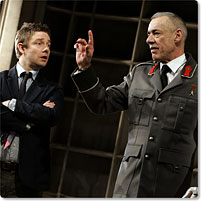Data
:
Premiere: 2007
Length: 2 hr.
Acts, scenes: Two acts, 12 scenes
Cast: 2 (2 men)
Koki Mitani
The Last Laugh

Koki Mitani
Playwright and director. Born in Tokyo in 1961, Koki Mitani graduated from the theater course of the Department of Arts of Nihon University. While in university, in 1983 he got together with fellow students to form the company “Tokyo Sunshine Boys.” With a strong focus on comedy, he has written many well-made plays with clearly depicted characters. In addition to theater, he has written the numerous screenplays for the television, and a good number of his representative works have been made into movies, such as Twelve Gentle Japanese (premiered 1990), taking its situation from the coming introduction of a jury court system in Japan; Warai no Daigaku (University of Laughs) (premiered 1996), a play about the cat-and-mouse game played between a light theater playwright and the censors during World War II (adapted in English translation by Richard Harris as The Last Laugh and performed in the UK and Japan in 2007); the human drama Ryoma no Tsuma to sono Otto to Aijin (Ryoma’s Wife, Her Husband and His Mistress) (Premiered 2000), about the life of the widow of the late Edo period hero Sakamoto Ryoma. Mitani made his debut as a film director in 1997 with Radio no Jikan (premiered 1993), a comedy he wrote in his theater company days about the slapstick goings-on during the recording of a radio drama, since then he has continued his activities as a film director as well. His theater company Tokyo Sunshine Boys has suspended their activities for 30 years as Mitani announced after their 1997 production Tokyo Sunshine Boys no Wana . His awards include the 4th Yomiuri Theater Grand Prix “Best Play” award for Warai no Daigaku , the 3rd Tsuruya Namboku Drama Award for Matoryoshika (1999), the 45th Kishida Drama Award for his first musical Okepi! (2000) and the Akimoto Matsuo Award of the 7th Asahi Performing Arts Awards of 2008, among others.

Set during World War II, this play is about a comedy playwright for a comedy theater who is trying to get official approval from the military for his latest play. The script must be read by the censors to confirm that there are no passages that violate censorship rules and then given an official stamp of approval. The playwright has become familiar with the censorship official and knows that a gift of chocolate always sweetens the review process. This time he has brought his usual gift of chocolate along to get his new play approved.
However, he arrives to find a new censor. He is informed that the former censor is now under investigation. What follows is a ten-day push-and-pull battle between the writer who need the approval for his upcoming performances and the stodgy censor who can’t even understand the simplest of jokes.
The new censor knows nothing about theater and can’t even distinguish between the script and the stage directions in the play manuscript. What’s more, he is discussed with the idea of someone trying to put on a ridiculous comedy at a time when the nation is fighting for its very survival. It is not an antiwar play to begin with and it doesn’t have any bold, controversial slogans, but still the writer must make all kinds of conciliatory efforts and convince the censor of the importance of laughter.
The play he has written draws on Shakespeare’s classic and is titled “Romeo and Juliet The Comedy.” It is just a harmless slapstick comedy. But, the censor has a little knowledge of the classics and so he commands the writer to put Henry Five in the play to make it more fitting as a wartime play. It doesn’t take the writer long to re-work his script and rename it “Henry and Juliet The Comedy.” Next the censor commands him to include the phrase “God Save Our Leader” three times in the play and to have the Divisional Chief Inspector appear and recite government policy. The writer rewrites the play with a role for a horse named God Save Our Leader and finds a way to have a handsome young actor appear as the Divisional Chief Inspector. He also makes sure to try to get on the censor’s good side with thoughtful little things like having the prop maker build a birdhouse to give to the censor when he learns that he keeps a pet crow.
As the rewriting proceeds, the censor begins to discover some of the fascination of playwriting and theater. But it doesn’t make him any easier on the playwright and he continues to order more changes, making suggestions for the changes himself and finally even puts on a wig to join in the rehearsals. In the process, the writer has been trying to convince the censor of the importance of comedy, saying things like, “Laughter is something human beings need to endure the cruelty of life,” and “It is a means to help us forget the fact that we are all going to die someday.”
But, in the end the writer lets his true desires get the better of him. He ends up putting the censor in a rage by offending his wounded heart at a sad time when the censor has learned of his son’s death on the battlefront. The writer realizes that all his efforts to that point have been for nothing when the censor finally orders to “Remove all the humor from the play.” The completely rewritten script he comes back with is nothing but a straightforward anti-establishment comedy. Of course it is rejected, but the writer knew what he was doing. He had just received his call-up papers. In the end he feels a sense of satisfaction at finally having written the play he wanted.
The censor had been at the theater the night before. He had heard so much about comedy and the meaning of laughter from the writer and, now that he bore the sadness of his son’s death, he wanted to find out whether or not it was true that laughter can be a balm for the soul. What he found was people lost in laughter, forgetting their wartime hardships and grief.
Due to his position, he could not approve the new play for performance. Still, during the time they had spent together had created a quiet but certain bond between the two. And, yes, isn’t a situation like this true comedy? In few words the censor wishes the writer good luck, that he may return from the war unharmed.
Related Tags

